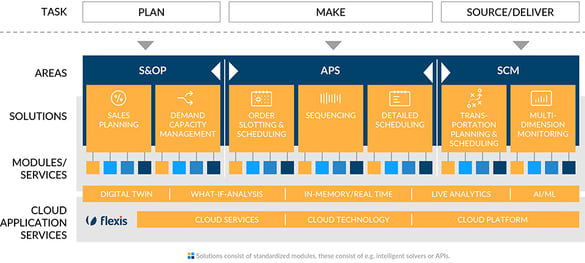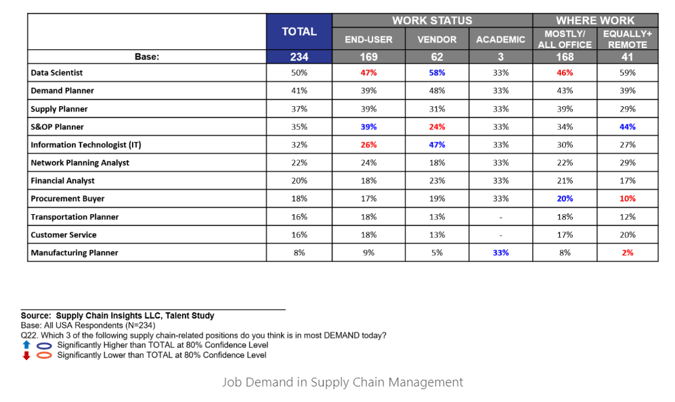Retaining Top Talent: The Strategic Role of Supply Chain Planning
Keith LaBotz - November 07, 2023

Digital transformation is reshaping supply chains, increasing demand for new skills, and a projected labor shortage could make it harder to secure this talent.
Rebecca Wannamaker, former White House Labor economist, said this at the Council of Supply Chain Management Professionals 2023 EDGE Conference this month:
“The number of unemployed people is as low as it’s been in the last 22 years, and there are more job openings than there are unemployed people. So the idea that we’re going to solve our problem by just retraining unemployed people doesn’t hold water in today’s economy. That’s not our current situation. Instead, we don’t have enough bodies.“
Even if this talent shortage doesn’t materialize, business viability hinges on digital success and supply chains must take measures to secure it. The most effective strategy increases automation and retaining experienced workers. So, where should your company begin?
The solution begins with the discovery of a relationship between supply chain alignment and employee retention. This article explains these findings and offers a practical, straightforward strategy for securing supply chain talent and accelerating digital transformation.
Supply Chain Collaboration Increases Job Satisfaction
Multiple studies show job satisfaction increases when supply chain processes align, resulting in employee retention.
- Research from Supply Chain Insights indicates supply chain alignment results in greater job satisfaction and employee retention. Supply chain alignment refers to cross-functional teams using coordinating goals, priorities, and systems to achieve shared outcomes.
- Fostering trust, growth opportunities, and employee well-being are vital to employee retention, according to a study by Deloitte. Nearly 25% of workers report they’re likely to quit in the next 12 months because employers fail to demonstrate these in action.
Aligning people and systems across multiple supply functions like procurement, production, and transportation around shared outcomes facilitates collaboration and makes it easy to understand why employee retention increases:
- Collaborative work is more harmonious, increasing employee well-being.
- Collaboration between teams increases trust, especially in virtual environments with little face-to-face interaction.
- Resources are reallocated to creating solutions instead of resolving conflicts, resulting in growth opportunities.
From a strategic standpoint, supply chain planning offers the most effective starting point for collaboration for several reasons.
Supply Chain Planning Solutions Facilitate Quick Alignment
Supply chain planning solutions require some degree of alignment in data models and business rules to do their magic, and the more extensive the functionality, the better. A good example of this is the flexis cloud planning solution, which optimizes planning across S&OP (Sales and Operations Planning), APS (Advanced Planning and Scheduling), and SCM (Supply Chain Management) functions. Shared visibility, business rules, and outcomes quickly align supply chain functions and introduce a framework for expanded collaboration.

Supply Planning is a Priority for Employee Retention
Supply chain planners are in high demand, so focusing on increasing job satisfaction here will secure talent in this crucial role. Furthermore, in the next five years, supply chain leaders expect a 35% shortage in talent for supply chain planning/analytics roles.

A Planning Solution Increases Digital Success
The digital framework for cross-functional planning can also guide the implementation of new solutions, increasing the success of digital initiatives. Sharing the same data model, business rules, and outcomes for planning and execution prevents data and functional silos which undermine digital transformation.
For instance, the flexis cloud solution introduces a digital twin of the supply chain to create a single point of visibility and control. Business rules and goals are digitized and updated in a single location as business requirements, technology, and partners evolve. The foregoing is available for all business functions, harmonizing decisions across the supply chain.
Bringing it All Together: How Planning Solutions Increase Employee Retention
An automated planning solution improves supply chain efficiency and effectiveness in multiple ways, and these boost job satisfaction:
- Profitability: Higher profits put a company at lower risk than competitors, making it more attractive to prospective and existing employees and fostering a sense of well-being and trust in management’s decisions.
- Communication: A single truth visible across all teams leads to better communication and understanding of organizational goals.
- Better Decisions: Improved decision-making prevents errors and waste, reducing stress and producing more satisfying outcomes.
- Agility: Collaboration enables proactivity, eliminating the frustration of helplessly watching problems unfold.
- Customer Satisfaction: Better planning and execution improve customer satisfaction, which translates to higher levels of job satisfaction, according to the Harvard Business Review.
- Sustainability: Planning improves sustainability. Employees with personal values that align with company sustainability goals will find greater meaning and purpose in their employment.
Conclusion
Implementing a holistic supply chain planning solution is the best strategy for quickly aligning the supply chain and retaining supply chain talent. It produces multiple benefits across a supply chain and provides a framework for successful digital transformation. flexis AG provides the cloud planning solution outlined in this article and helps companies achieve the benefits discussed.
If you want to learn more get your Guide "Why the cloud is the future of manufacturing"
In this Guide you will learn:
-
New potential of cloud-based manufacturing
-
Opportunities of the cloud for the production
-
Technological advantage of flexis technologies
LATEST POSTS
- Understand Circular Economy in The Manufacturing Industry
- How Can Industry 4.0 IT Integration Be Achieved Smoothly?
- The Significance of Order Sequencing in Discrete Manufacturing
- How to improve your Supply Chain Management: The Power of Control Towers
- Optimizing Human Resource Scheduling in Manufacturing: A Technological Approach



